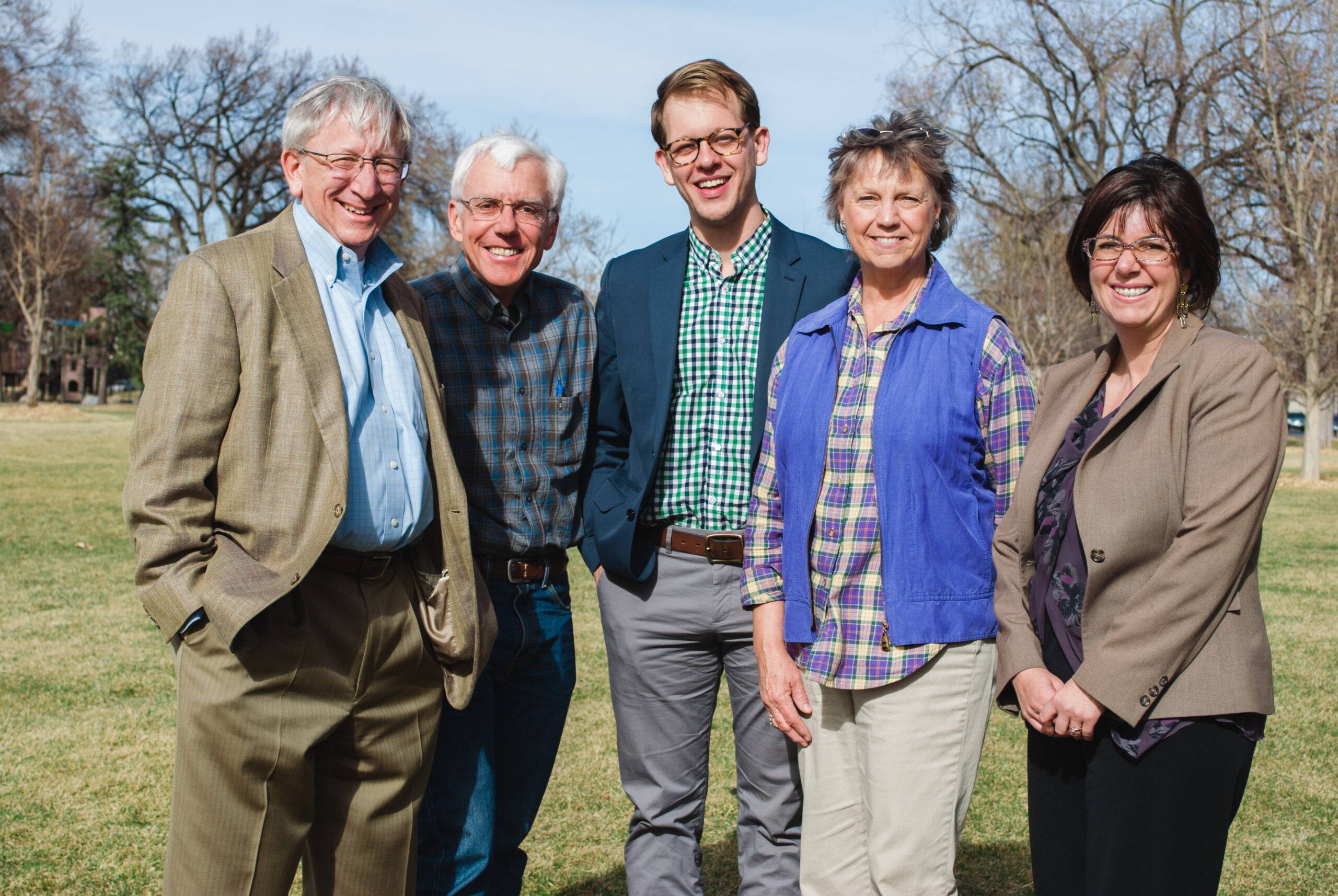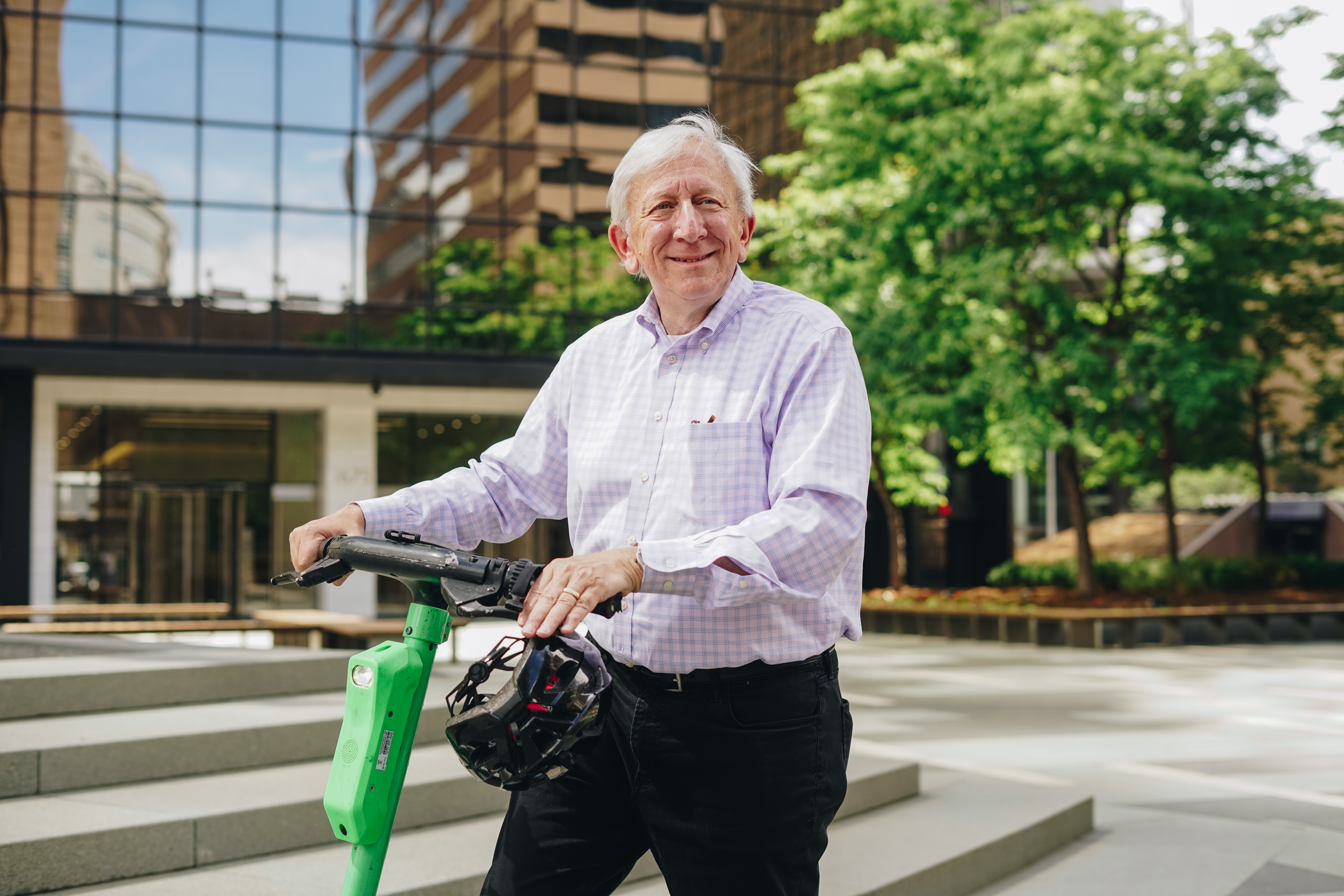Pictured above: Peter Kirsch, photo by Armando Geneyro
Some people discover their passions late in life. For fundholder and trustee Peter Kirsch, his focus was apparent from the start. “I’ve always been interested in environmental issues and conservation. I guess you could say I was born with it,” explained Kirsch.
Kirsch has dedicated his professional and personal life to driving environmental impact, which has taken many forms along the way. As a partner in the law firm of Kaplan Kirsch, he’s been entrenched in the battle for a cleaner, greener planet for the better part of 40 years.
– Peter Kirsch
Kirsch represents clients ranging from local governments to the private sector and public interest groups in negotiations and litigation over land use entitlements, the environmental impacts of infrastructure projects, and compliance with federal transportation laws and regulations. He has litigated cases before administrative agencies, numerous state and federal trial and appellate courts, and the U.S. Supreme Court.
Outside of his legal work, Kirsch has engaged with his community in other ways, sharing and expanding his expertise and knowledge by serving on the board of trustees for dozens of environmental and conservation nonprofits over the years.
This collaborative approach has broadened his understanding of the issues, his desire to engage in other ways, and his network of individuals and organizations who share similar goals and objectives. While his early career was focused on this area, his commitment to giving matured as his ability to give increased. Then he formed his connection to philanthropy and The Denver Foundation.
“There wasn’t some eureka moment for me. Everything happened gradually and has grown over time, but I first got involved with the Environmental Affinity Group (EAG). There was this acknowledgment that environmental philanthropists in Colorado didn’t talk to each other very much, but there was an extraordinary amount of good work being done in Colorado without a lot of publicity. A lot of great people were doing critical things, but they weren’t connected to the philanthropic community more broadly.”
The EAG funds environmental and conservation organizations using an inclusive approach to support communities, reach new audiences, and encourage action on climate change. EAG members can give together through collective grantmaking, learn together through site visits and quarterly educational events, and grow effective environmental philanthropy by lifting up organizations doing strong work.

Affinity groups and giving circles are a form of collective giving where individuals pool their charitable contributions to create a much larger gift, potentially making a greater impact. Groups are organized for many reasons and contribute to a broad range of charitable causes. Giving circles and affinity groups help democratize philanthropy, welcoming people of all income levels to the power of giving. The Denver Foundation offers nine collective giving methods.
According to Kirsch, “We’re building a big tent. There are a lot of people who are frightened, flummoxed, intimidated by the idea of philanthropy. And this is a great introduction to environmental philanthropy. The EAG wants to bring in new people to the conversation: younger people, the next generation. People who want to engage, but don’t know where to start. People who may be modest in their giving capabilities today, but want to do something. We hope they can learn more about the process and get inspired. The EAG really is a great point of entry.”
Part of collective giving means the group must determine its goals and objectives through consensus. Some groups are built based on donors’ identities, such as LatinasGive!, while others form around the common causes they want to support. Kirsch has witnessed the EAG’s priorities adapt and evolve. “The work changed dramatically — not just for the EAG, but for the entire organization — when CEO Javier Alberto Soto made it clear that environmental and conservation issues and especially environmental justice were going to be a leg of The Denver Foundation’s strategic direction. That was a dramatic shift, and a very welcome one.”
This was a time of transition for our organization as we developed our new strategic framework and, under Soto’s leadership, shifted our focus areas and funding to address environmental issues. That was not the only place where we shifted our direction, and Kirsch has been an important partner as the foundation enters policy and advocacy work.
Engaging on new fronts
Kirsch serves as the chair of our policy committee. Established a little more than three years ago, this committee examines policy issues to ensure they align with the foundation’s priorities and policy principles. We developed the guidance for this work based on our policy framework and feedback from nonprofit organizations, grantees, fundholders, and community members
“Policy work is a new realm for community foundations. If our objective is to promote environmental justice, help communities of color, or promote education, for example, then simply making our money available is not enough. So much of what we do is affected by public policy. Something as simple as preserving the tax deductibility of charitable contributions, to something as complex as how much the government should spend on affordable housing. I believe The Denver Foundation has a moral obligation to engage in policy conversations,” said Kirsch.
This year, we took policy positions on 22 different pieces of proposed legislation, with a focus on education, housing, economic opportunity, and climate and the environment. Our policy work includes hosting policy conversations with legislators, testifying on certain bills, and grantmaking to nonprofit organizations to support their own policy and advocacy work.

When asked about his experience on the policy committee, Kirsch said, “We are an influential member of the community, and for us to remain silent on the key issues that affect our grantees is shirking our responsibilities. This is enormously difficult work, but it is pivotal and consequential. I believe in the past three years we have established ourselves as a credible, honest, factually accurate participant in the policy debate, and very few organizations can do that.”
While our policy work continues to grow and evolve, it has already exceeded the expectations of many, including Kirsch. “We have been more successful than my wildest dreams. And we have established ourselves as an influential voice in the policy arena.”
For those who want to engage in this critical work, you can give directly to our Civic Fabric Fund. The fund provides nonprofits with grant dollars to support, their policy and advocacy efforts, including the critical activities of voter registration and engagement.
Grow giving at home
While collective giving is important, and harnessing the power of effective policy can make a tremendous impact, Kirsch knows that the future of philanthropy really begins at home. Inspiring the next generation of philanthropically-minded people is less of a pursuit and more of a duty. This is something Kirsch and his wife, Patricia Reynolds, have instilled in their three sons.
“My wife, Patricia, is deeply involved in education, and we’ve done a fair amount of work there. While our sons may not have major money to give now, giving is what they’ve grown up with. It’s like brushing your teeth — it’s what you do. That’s part of one’s obligation to the community, however you want to define your community. Our sons enthusiastically support our efforts and they are already demonstrating a commitment to philanthropy”
When asked what he tells his children about where to start their philanthropic journey, Kirsch said, “Jump into the deep end. If you have $10, give $10, and then follow the organization. After a year, you may think your dollars were misspent, and if so, OK. You can always change your mind. But you get the chance to learn about that organization and the issue. Just try it out. Then, begin to figure out what your focus is and follow your passion. There will be somebody who does precisely what you’re interested in. And your personal engagement is going to be meaningful to you and meaningful to them.”
Family giving is a great way to connect and collaborate with your kids and grandkids. It provides an opportunity to strengthen relationships and learn together. Families who give together grow together. And it may benefit you in ways you never imagined.
– Peter Kirsch
When asked what element of this has been most meaningful for him, Kirsch shares some powerful words. “I’ve had the opportunity to meet both grantees and other donors who are passionate about subjects I didn’t know much about, broadening the scope of my understanding of what philanthropy has available and what it can do. I had been narrowly focused, and the education that I’ve gathered from The Denver Foundation has been way greater than what I’ve given to The Denver Foundation. I appreciate that a great deal.”
We appreciate Peter Kirsch a great deal, as well.
Are you passionate about climate and environmental issues? This is your chance to join the conversation. Engage in policy work, explore collective giving, or start planning with your family. There are so many ways to be part of this work. Let’s start a conversation and find out what works best for you. We’ll be there to help you every step of the way. Contact your relationship manager or email help@denverfoundation.org.
